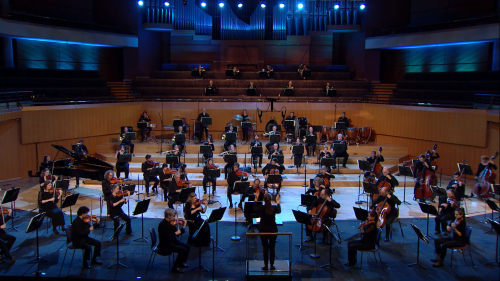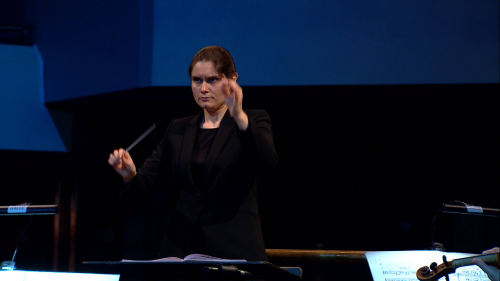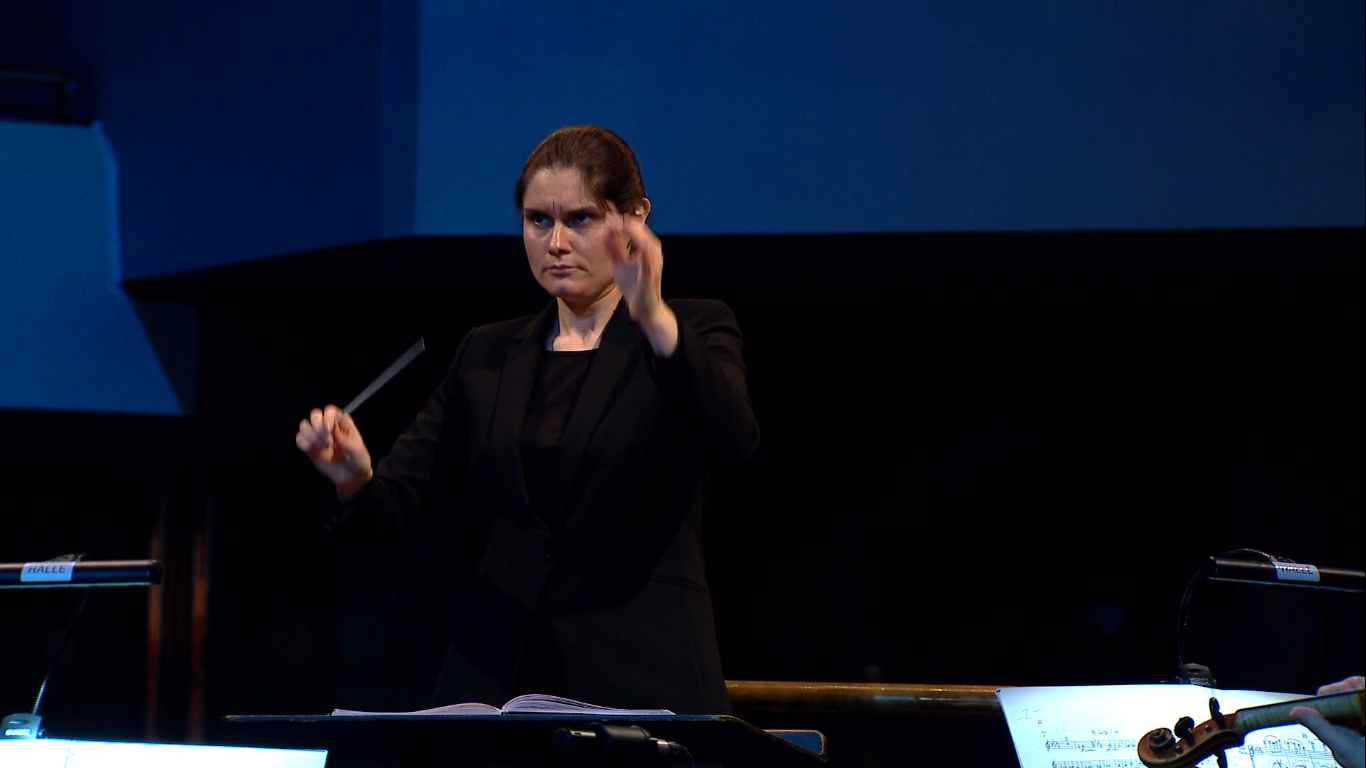 United Kingdom Bacewicz, Copland, Shostakovich: Hallé / Delyana Lazarova (conductor). Broadcast (directed by Jonathan Haswell) from the Bridgewater Hall, Manchester, and streamed on 1.4.2021. (JPr)
United Kingdom Bacewicz, Copland, Shostakovich: Hallé / Delyana Lazarova (conductor). Broadcast (directed by Jonathan Haswell) from the Bridgewater Hall, Manchester, and streamed on 1.4.2021. (JPr)

Bacewicz – Overture
Copland – Appalachian Spring: Suite
Shostakovich – Symphony No.1 in F minor
A significant Hallé stream in their ongoing Winter Season following some unseasonably warm UK Spring weather! Notable for the debut of their new Bulgarian-born Assistant Conductor Delyana Lazarova who won the inaugural Siemens-Hallé International Conductor Competition in – the now halcyon days of – February 2020. The Hallé‘s Music Director Sir Mark Elder praised her win by saying, ‘The first thing that struck me about her was that she seemed in control of herself and it’s very, very hard when you’re a young conductor to be at home with yourself when you’re in such a pressured situation. She seemed to me to have poise and she may have been terrified inside but she didn’t show it and that gives an orchestra confidence that she will let them play. Because we can’t control an orchestra unless we’re in control of ourselves and that was very remarkable in someone so young.’ He then when on to compliment Lazarova’s ‘natural way of speaking to the orchestra’ and how her ‘conducting above all was very passionate, it was straight to the heart of the feeling in the music.’
Lazarova’s short first concert was bookended with music by a somewhat overlooked female composer and another work first premiered in the UK by the Hallé, along with some Copland in between. Grażyna Bacewicz (1909-1969) wrote several piano pieces, chamber works, concertos and symphonies. From the age of 15 she studied composition, violin and piano at the Warsaw Conservatory and moved to Paris in 1932 to further her studies with Nadia Boulanger. Apart from composing she was a virtuosic violinist and after returning to Warsaw she became concertmaster of the Polish Radio Orchestra before the start of WWII. Bacewicz’s Overture was composed during the German occupation of Poland in 1943 and the following year she fled Warsaw during an uprising.
The Overture employed almost the entire Hallé complement socially distanced in front of Lazarova. Underpinned by timpani and strings the Overture set off on a rousing Allegro before we heard some agitated brass from the choir seats at the rear of the orchestra. A quieter, more contemplative, passage (Andante) followed, and we had the first of several significant contributions (throughout this concert) from Amy Yule’s flute and Sergio Castelló López’s clarinet which seemed to intertwine here. This respite was fleeting as the music ramped up as the Allegro resumed and there was a headlong rush to the final triumphant chord. All of this in six intriguing minutes from Lazarova and the resplendent Hallé.
I am sure I have heard Appalachian Spring before and am sure I didn’t think anymore of it then as I did now. It is an accessible – though meandering – work and, for me, does not really do justice to its history. I understand it was commissioned by Martha Graham and Elizabeth Sprague Coolidge as the score for a new ballet which Graham would choreograph and dance in. The first performance of Appalachian Spring was in 1944 at Washington DC’s Library of Congress Coolidge Auditorium. Graham had given the composer the straightforward scenario of a new Pennsylvanian farming community, a young couple’s wedding and the building of their first home. Copland scored it for just thirteen string and wind instruments and gave it the simple title Ballet for Martha. Before its first performance Graham renamed it Appalachian Spring after a poem by Hart Crane. Anecdotally, Copland apparently queried whether this now had anything to do with ballet and Graham’s answer was ‘No, I just like the title’!
Talking straight to camera the personable Lazarova introduced Appalachian Spring by describing it as a set of dances and how ‘each of the instruments has a certain character and a role’ without, unfortunately, telling us what they were. Certainly, Gemma Beeson’s sterling pianism was to the fore from the start and her contributions were often either tinkly or percussive. Copland’s work is only a little more that 20 minutes but throughout it is all alternatingly slow, slow, quick-quick, slow! Flute and clarinet are prominent once again together with permanent guest leader Paul Barritt’s violin and Elena Comelli’s bassoon amongst the other significant solo contributions. Lazarova had little to do but give a clear beat and jolly the music along. When the music was at its most characterful one of the better passages was the folksy hoedown, soon followed by the very recognisable and very emotive Shaker melody ‘The Gift to Be Simple’. Muted low strings picked up on this and brought Appalachian Spring to a prayerful culmination as the small Hallé ensemble played as one whilst the music faded.
Lazarova explained how ‘Part of our Winter Season is including premieres that have happened right here in Manchester by the Hallé. When I was looking at the list, Shostakovich’s First Symphony came across and I was surprised to see that the British premiere had happened here on January 21st, 1932, with conductor Hamilton Harty.’ Shostakovich’s First Symphony was written in the mid-1920s as his graduation piece at the Petrograd Conservatory and was completed when he was 19. It is believed to have created something of a blueprint for Shostakovich’s numerous mature symphonies: his music rarely lets up, is fevered and energetic, occasionally acerbic, with bittersweet waltzes and episodes of darkness and tragedy.

There was a feeling that the Hallé could have played Bacewicz and Copland on their own, but the players now looked as if they were following Lazarova more intently and there was a greater sense of her as an interpretive mediator with her well-practiced gestures and animated face. The first movement was notable for sounding like deconstructed Mahler with its march-like Allegro and raucousness. Though less than ten minutes it felt longer and then the second movement packed almost too much into about five minutes. The piano entered for the first time with some rapid runs and Lazarova did well to keep all the mercurial changes of gear under control. Crashing piano chords ended it all and Stéphane Rancourt’s plaintive oboe solo introduce the Lento which itself sounded sad and mournful. Gareth Small was at his very best in the elegiac trumpet solo and a drum roll attacca bridged the third and fourth movements. After a sombre opening with more runs up the piano keyboard the music quickened for the Allegro molto and would reach a furious climax before calm was restored once again. The following Allegro concluded with John Abendstern’s fortissimo timpani solo, then Nicholas Trygstad’s reflective cello accompanied by muted strings began the ascent though the coda and on to the exciting, exuberant, filmic finale with its brass fanfare.
Jim Pritchard
For more about the Hallé click here.
